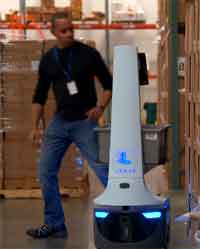| |
u |
| |
|
 |
Supply
Chain by the Numbers |
| |
|
| |
- May 13, 2020 -
|
| |
|
| |
|
| |
|
| |
Trucking, Warehouse Jobs Fall Sharply in April; Target Swoops Up Deliv Technology; Largest Mall Operator Says Show will Go On; Warehouse Robot Technology Startup Raises Big Bucks |
| |
|
| |
| |
| |
| |
83,300 |
|
That's how many US transportation sector jobs were lost in April, according the new data from the Bureau of Labor Statistics, as freight volumes outside a few categories such as food continue to fall rapidly, and loads even in the stronger sectors may be weakening a bit. And even high flying employment in the warehouse sector also dropped sharply, with the loss of 74,100 jobs in April even as Amazon and a few others keep hiring. With freight volumes down, naturally shippers needs few workers to pick products and load those truck trailers. One bit of good news in the overall logistics sector: parcel operators added 1,800 jobs in the month, basically flat but better than negative, as ecommerce deliveries remain strong. But the job losses in trucking and warehousing pale in comparison to the incredible 1.33 million manufacturing jobs lost in April.
|
|
|
| |
| |
|
|
|
That's how much last mile delivery firm Deliv had received in venture capital since its founding in 2012. But those investor won't have much to show for it now, as the company announced last week it was ending operations in August. Deliv offered same-day delivery on behalf of Best Buy, Macy's, Mercato, Walgreens and others retailers. It is not clear what happened, but many retailers have not been allowed to open for two months, and the cash drain may just have been too much for Deliv to survive. Interestingly, that allowed Target stores to acquire some of Deliv's technology on the cheap. Target already owns on-demand delivery service Shipt, which it acquired in 2017 for about $550 million. But NBC reported that Deliv is in the process of completing a deal to sell technology assets to Target and Deliv's CEO along with a subset of the team will be moving over to Target. The cost of those assets is small enough that Target views it as non-material. NBC also says Target will not use the technology to try to maintain or gain business with other retailers outside its own fulfillment needs, even though Shipt continues to operate as a separate company |
| |
| |
|
| |
| |
$35.5 Million |
 |
That is how much money in seed financing a company called SVT Robotics, a Norfolk, Virginia start-up, announced it had raised this week. The company has an interesting niche: building an API-based hub for shippers and contract logistics providers to connect to whatever warehouse robotics platform they might need to use. In essence a type of middleware provider, the company says that by building the APIs its "interoperability platform"
will reduce the cost, complexity, and time frame for connecting with the range of robotics systems in use in warehouses. For example, instead of setting up specific connections with five robotics systems in five different facilities, a contract logistics provider managing those facilities could connect to SVT, which would give it built-in access to all those different systems. In reading about the SVT investment news, SCDigest also learned a new term: integration-platform-as-a-service (iPaaS), which extends far beyond warehouse robots. For another supply chain example, a company called project44 initially set out to provide such a platform for shippers to connect directly with carriers and brokers without having to set up individual electronic data interchange (EDI) connections for each service provider. With strong growth predicted for robots in distribution, easy connectivity may be attractive to many. |
| |
| |
| |
| |
| |
|
|
|
| |
 |
 |
| |
 |
![]() |
 |
|
| |
 |
Feedback |
|
|
|
![]()
|
No Feedback on this article yet.
|
|
![]() |
|
|
|
![]() |
 |
![]() |
 |
|
| |